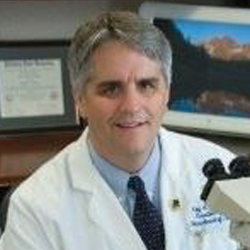During the pandemic, cancer patients undergoing treatment or participating in clinical trials at The University of Kansas Cancer Center (KU Cancer Center) don’t have to worry about whether they can get a test for the novel coronavirus that causes COVID-19. The center’s research arm stepped up to allow patients to join a study that provided the test in recent weeks and covered its cost. It is just one of the many ways the center is working to fight the pandemic.
Roy Jensen, MD, director of the KU Cancer Center, said coronavirus testing is especially important for cancer patients.
“These patients have a higher risk of becoming infected, and the subsequent symptoms can be more severe if they are,” Jensen noted. “Many of the treatments for cancer also can suppress the immune system, which needs to be at full strength to combat the virus. Since it’s becoming clear that asymptomatic patients can be carriers of the virus, testing is now more critical than ever.”
Testing is now available as a standard procedure for cancer center patients through the University of Kansas Health System. Prior to tests being available through the health system, more than 500 cancer patients received coronavirus tests at no cost to them because of a clinical trial conducted through the research arm of the KU Cancer Center.
To access the test, patients could opt into a registry that tracked the COVID-19 test results and the cancer-treatment timeline of patients testing positive for COVID-19. The cancer center’s research budget paid for the cost of the test.
Clinical trial participants who tested positive for COVID-19 had discussions with their physician and treatment team to determine best next steps. They weighed the risks of treating the patient who was COVID-19 positive versus delaying treatment until the patient recovered from COVID-19. The study offered follow-up testing until the clinical trial participant tested negative.
The center also is participating in three registries currently tracking how COVID-19 affects individuals with cancer and run by the American Society of Clinical Oncology (ASCO); the COVID-19 and Cancer Consortium, led by Vanderbilt University; and a local KU Cancer Center registry developed by Dr. Weijing Sun. A fourth registry is slated to open later this spring through the National Cancer Institute.
The KU Cancer Center also has been helping efforts during the pandemic by providing a template for the center, the University of Kansas Health System, and the University of Kansas Medical Center to work together on COVID-19 clinical research. Members of the three organizations saw the need to meet regularly and create avenues for research cooperation for the patients’ benefit.
“If people aren’t coming in for their clinical trial appointments, they are getting called to see why they’re not coming in,” said Natalie Streeter, MSN, executive director of clinical research, strategy, and operations at the KU Cancer Center. “Are they not coming in because they’re sick, or because they’re scared and worried about leaving the house? We tell them coming in is still in your best interest, because cancer is not waiting for the pandemic to be over.”
Edited by Gary Cramer



